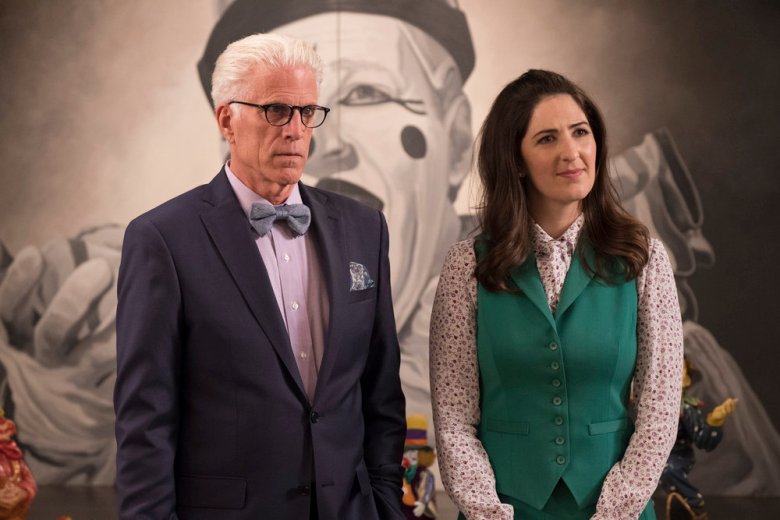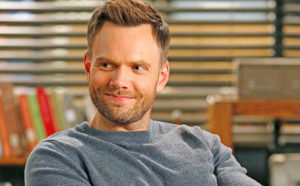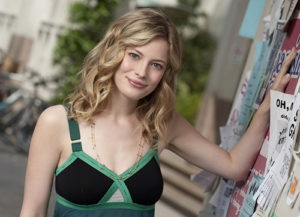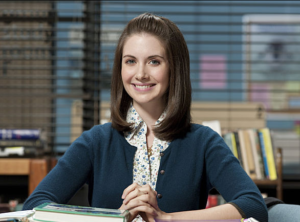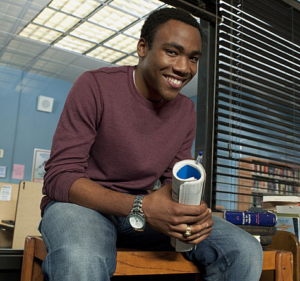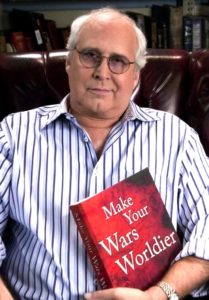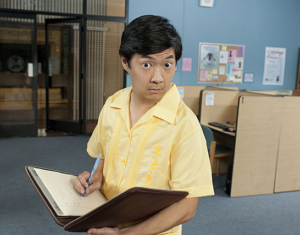 This month is Power of Love month, where most of the website’s content is dedicated to those who are caregivers and romantics. They believe that those they love owe them for their constant affections. There is nothing they won’t do for love, with it be for selfless or selfish reasons. These Characters can be mentors and parents, lovers, or stalker or clingy, needy nightmares!
This month is Power of Love month, where most of the website’s content is dedicated to those who are caregivers and romantics. They believe that those they love owe them for their constant affections. There is nothing they won’t do for love, with it be for selfless or selfish reasons. These Characters can be mentors and parents, lovers, or stalker or clingy, needy nightmares!
We will celebrate Valentine’s Day month by examining these characters. I’ll be looking at some of these examples from TV, Film and elsewhere throughout the course of February.
I recently viewed an excellent high-concept sitcom produced by NBC and Netflix called The Good Place. It’s created by Michael Schur, the co-creator of Brooklyn Nine-Nine and Parks & Recreation. Unlike, but those sitcoms, it manages to do something really original. I have to be careful how much I say because each episode is full of twists and turns I don’t want to spoil the fun.
The basic premise it this: Eleanor Shellstrop (Kristen Bell) has died and gone to “The Good Place”, which is basically Heaven. But Eleanor doesn’t belong there- she was brought to “The Good Place” by mistake- and is terrified someone discovering the mistake. With the help of her friends, she tries to avoid detection until she can become a good enough person to stay.

The Good Place is managed by Michael (Ted Danson), the architect of the neighborhood and a classic Power of Ambition character, desperate to please his boss and keep the inhabitants of The Good Place happy. Eleanor’s fellow inhabitants include Chidi (William Jackson Harper), a Moral Ethics professor who couldn’t be more Power of Conscience if he tried- his constant consideration for every possible ethical outcome caused his death.
There is also couple Tahini (Jameela Jamil), a British socialite who is determined to have the best, the finest, the most exquisite things in The Good Place, and Buddhist Monk Jianyu (Manny Jacinto) a simpleton who lacks common sense – Power of Idealism and Excitement respectively- who are incompatible as soulmates. Eleanor, both before and after her transformation from a self-absorbed jerk, is Power of Love.
Eleanor very quickly attaches herself to the rest of the ensemble out of necessity, believing they owe her something as they become embroiled in her conspiracy- that Michael cannot know that she should be in The Bad Place. Power of Love characters make themselves indispensable to those around them, smothering them with affection or acting needy and possessive of them. Without these people, Eleanor faces eternal damnation.
As the series progresses, the main ensemble of characters are kept together by Eleanor as she truly learns to love them and becomes protective of them. The most selfish character becomes the most selfless, at first out of necessity, then eventually out of genuine affection for her friends. Eleanor judges herself by how her friends perceive her. Everything she does in The Good Place is for her friends, and for Michael’s self-preservation.
The show is full of ethical questions, which makes it a bit more interesting than your average sitcom. It is a Power of Love because every decision our lead characters make is out of love for the others, or because they feel they owe something to the others. They are all dependent on each other, and though it may not seem like it at the start of the show, they love each other.
I would highly recommend this show; it’s the best new sitcom I’ve seen in quite a while and provides a great example of a Power of Love character in Eleanor. The Good Place it is a Power of Love story answering the question– what do we owe each other?
]]>
by Guest Contributor Oscar Harding
 Despite gaining something of a cult status after its six-season run, NBC sitcom Community still isn’t talked about enough. Not only is it smart and consistently funny, but its sweet and a true testament to the Power of Imagination. We’ve all suffered or enjoyed being part of a study group at some point in our life- no matter how absurd it gets, the show has always been relatable or at least has had an emotional truth to it.
Despite gaining something of a cult status after its six-season run, NBC sitcom Community still isn’t talked about enough. Not only is it smart and consistently funny, but its sweet and a true testament to the Power of Imagination. We’ve all suffered or enjoyed being part of a study group at some point in our life- no matter how absurd it gets, the show has always been relatable or at least has had an emotional truth to it.
The show is a brilliant lampooning of various kinds of Film and TV tropes, but the reason it works so well emotionally is “The Greendale Seven”. The Seven is a study group originally formed for a Spanish class. All seven then go on to take Anthropology, Biology, and History. In addition to The Study Group, their flamboyant Dean and insane former Spanish teacher round out the ensemble.
As the show progressed, certain actors from the key group of nine left the show and the emotional holes are all too visible.. Like in life, there is a bittersweet passage of time- although that doesn’t really justify a drop in quality. It just proves that character is always key. This is a lesson that both Lost and, perhaps, Twin Peaks could have learned from. The simpler something is, the better.
The Study Group is utterly dependent upon each other. Their dynamic is severely impacted when anyone is missing. They even regress as people, in some instances. I’ll be exploring how each member is part of a jigsaw puzzle that only really works when every piece is put together. Without each and every person, the show doesn’t quite work as effectively.
Power of Will
“Get me something cold and imported”
Although it could be argued greatness is thrust upon him, no Power of Imagination character would be able to control a group of people in the same way Jeff does- that character type is for the most part selfless. Jeff is every bit a Power of Will character. However, he is not a villain but instead a complex protagonist. He may be in control most of the time, but he only ever flexes his muscles when he is challenged, or actually called upon to enforce his will on others. Although he doesn’t often actively seek to be a leader or be in control, when his authority is threatened by outsiders he becomes aggressive. This is when his Power of Will character is most apparent.
Despite his obsession with his health and physique, he prides himself on avoiding work and actually putting in effort- the very crux of the show is that Jeff has to go back to college because he falsified his qualifications. He is terrified of losing control and will do whatever he can to keep it. If anyone is considered better than Jeff, he will snap- this is when his Power of Will character is most apparent. He is terrified of losing control and will do whatever he can to keep it. If anyone is considered better than Jeff, he will snap- this is atypical behaviour of Power of Will characters.
So he may not conquer and dominate, but when someone gives him power willingly, as he is charming and convincing, he becomes obsessing with keeping it- and it is the Study Group that encourages him to act on the Power of Will personality he has. It is fascinating to see a protagonist that is a Power of Will character, because they exhibit traits that are traditionally considered by villainous and antagonistic. But he is incredibly likeable whether we see his flaws or at his default mode of “the leader”. As the show goes on, his warmth and affection becomes more apparent and he softens. However, his Power of Will traits can come through at any moment.
Power of Idealism
“You seemed much smarter when I met you”
“Thank You”
Being part of a group means Britta can indulge the worst traits of being a Power of Idealism character type. She wallows in self-pity, suffering intense mood swings and always having someone to exhibit her intense pain or joy to. Whilst the Study Group can actually benefit each other in some way, acting as foils for each other’s character types, Britta is the only member who actually outright suffers by being part of a group. By actually belonging and being backed up by friends, there is no epic drama so she has to create it.
A former “political activist”, in the loosest sense, Britta Perry (Gillian Jacobs) has an interesting arc in that she goes backwards once she joins the Study Group. Every other member either remains an unchanging constant, or evolves into a better person. Britta begins as the stable heart of the group, but soon becomes referred to as “the worst” and a “buzzkill”, and it’s all downhill from there.
She soon becomes the clown of the group, even more so than Pierce. This can be attributed both to the dynamic of the Study Group, but also the fact she is a Power of Idealism character. These characters, such as Carrie Bradshaw, Rick Blaine and Zhivago, believe life is a dramatic struggle, forever needing to be epic and exceptional. Britta preaches activism constantly, reminding people of how the system is oppressing them, and how there is injustice they should be speaking out against, yet she can never quite deliver on this herself.
However, her constant striving to tackle what’s wrong in the world does rub off on the rest of the group- more often than not, she is the one to tone down Jeff, or make Pierce be more considerate of how his actions affect others. It is interesting how her character can, in moments of clarity, save the Study Group from itself by reminding them never to be complacent.
Power of Reason
“TV adheres to logic, reason, rules. But in real life, we have this. We have you.”
Power of Reason characters see the world as a series of puzzles to be solved, and always use a frame of reference to decipher things, be it a simple conversation or an actual mystery. Abed’s frame of reference is Popular Culture. When he does not get his way, and people or events deviate from his line of reasoning, he goes beserk. This is a regular occurrence and is the only time we see the cool, logical Abed a dramatic breakdown.
Abed Nadir (Danny Pudi) may not be the leader of the group, or even its central focus, but he is certainly its heart. He represents the best and worst about Community. Although it is a habit he improves upon as the show progresses, and the Study Group makes him less of a Power of Reason character, Abed filters his understanding of the world through what he sees in Movies, TV shows and comic books. He believes real life is like a TV show, and is obsessed with meta narratives.
He is a classic Power of Reason character, only getting emotionally involved with events when he believes it will drive forward the narrative of the TV show in his head, or a student film he happens to be making. The Study Group inadvertently helps him engage more emotionally and be more socially conscious, but they also encourage his bad habits by going along with many of his more insane ideas that allow him to better understand the world. Because he does not get tangled up in petty arguments and affairs of the heart, like everyone else, his detachment can often resolve conflict. In his most graceful moments, Abed is capable of incredible warmth because of the friends he surrounds himself with- and it is a pure warmth because he is unaware of his impact on others as it is a distraction for him and he admits to not fully comprehending things in the same way as the others.
Power of Conscience
“I am being assertive, and it is getting results!”
Power of Conscience characters, especially in comedies, are exposed for their hypocrisies, and the dark side of their character- going to extremes to maintain what they believe is just- can make for some very funny scenarios. We learn that Annie is unhinged and it is always hilarious, rather than disturbing. She starts as uptight, obsessed with maintaining order, and eventually learns to relax- but evens as her character learns and grows, she maintains a neurotic streak that comes out at the most inconvenient times.
Annie begins as one of the strongest characters, but in the show’s final season she is doing evolving and is given little to do, rarely relapsing into her old ways but losing the essence of her character.
Starting out as arguably the “child” of the group, even though she and Troy are the same age, Annie Edison (Alison Brie) is one of the characters who actually grows up and matures throughout the course of the show (as do Troy, Abed and Jeff. The others, not so much). However, the trappings of being a Power of Conscience character remain throughout.
When we are introduced to Annie, she is a goody two-shoes bookworm who always believes in what she deems to be fair and this is why her constant clashes with cheating slacker Jeff are so amusing. She is met with the polar opposite to herself, and their relationship is one of the most enduring in the show because they change each other for the better.
Power of Imagination
“You moving in here was supposed to tone us down!”
It’s interesting in such a madcap sitcom about a community college that former jock Troy Barnes (Donald Glover) has greatness thrust upon him in a place where no epic quest is ever likely to unfold. However, Troy’s arc from ignorant egotist to a hero with a heart of gold is arguably the most satisfying character arc out of anyone in Community. He leaves the show eventually with his head held high, and has changed for the better because of his time at Greendale with the Study Group. Whenever the show frequently takes diversions into genre spoofs of everything from westerns and space operas to police procedurals and action movies, Troy is always our reluctant hero even if he is not the natural leader.
Surprisingly, it is Power of Excitement character Pierce who turns to him most often for guidance and support (similar, in fact, to the dynamic of Rick and Morty). In fact, at some point every character puts their trust in Troy even when he believes he can’t help them. Like any Power of Imagination character, Troy brings harmony and balance, in this case to Greendale.
But, mostly because of his emotional investment in Abed, Troy willing to go along with the regular descents into high-concept madness that Community takes. He is a conventional Power of Imagination character in an unconventional setting you wouldn’t expect to house a reluctant hero like Troy.
He is the only person who truly understands Abed, and their friendship is one of the most charming in American television. He often guides Abed and assists him more than anyone else, because he has responsibility placed on him to guide his friends on the right path, whether it is in a ludicrous scenario or real-life dilemmas. Whether his foil is Power of Excitement or Power of Reason, Troy is forced to step up for the good of those around him.
Power of Excitement
“Ain’t no party without drugs!”
Pierce Hawthorne (Chevy Chase) is a perennial agent of chaos, immediately identifying him as a Power of Excitement character. Pierce adheres to every stereotype of a Power of Excitement character- constantly seeking to please himself and have fun, he gets bitter and jealous when he is excluded from anything exciting, often with disastrous results.
A spoilt man-child who inherited a moist towelette empire, despite belonging to an accepting Study Group, Pierce often sabotages his friends as well as himself simply through his personality. As we explore his backstory through the show, we learn he is very much a “Peter Pan” type who never really grew up on account of his enormous wealth and oppressive father. He may not be the suave playboy type, like other Power of Excitement characters such as James Bond, Tony Stark or Indiana Jones, but his downfall is his refusal to ever settle. He has studied at Greendale longer than any of his friends because it is the only place where he can get his “fix”.
Pierce has moments of elderly wisdom and profound kindness, but they are few and far between. When these moments occur, they have so much more impact because it is unexpected, so is never completely irredeemable, but he never really evolves because of belonging to the Study Group, remaining a constant irritant and disruptor. However, there is an entire episode dedicated to the group dynamic when they temporarily exclude Pierce, and it becomes apparent that they need him every bit as much as he needs them.
Power of Love
“He’s dead to me, and anyone who goes to that fight will be too. Now, let’s sing!”
Power of Love characters may not mean to be so domineering and aggressive, but it is in their nature, and Shirley is no exception. Everything Shirley Bennett (Yvette Nicole Brown) does is for those that she loves, whether it’s her sons, the Study Group or Jesus. She often believes she has to save her immoral friends in the Study Group from themselves. Even her friends have described her as “cloying” before.
But Shirley always means well- there are rarely malicious or selfish actions behind her intentions. But she displays the archetypal flaws of Power of Love characters- her affection and concern seems to translate in possessiveness and and aggressive need to dominate her friends hearts. Just because she seems sweet, besides her constant baked goods, doesn’t mean she is innocent.
Shirley sometimes just doesn’t understand why her friends don’t listen to everything she suggests, but she is relentless in making them see her point of view for their own good. She has sometimes even admitted that she is so kind and affectionate so that others will love her unquestionably.
Surprisingly, the characters who understand her most are Jeff and Pierce- sharing similar traits and the more life experience than their younger friends, these two relationships in particular are interesting because they show each other their strengths as well as their flaws. A Power of Love character makes sense as part of an ensemble, be it dramatic or comedic. Shirley belongs in the Study Group and the other members don’t realize how important it is they have a friend like her, just as flawed by the most loving and forgiving of them all.
Power of Truth
“I’m nuts, Jeff! Get with the program!”
Power of Truth characters are usually Detectives like Clarice Starling, or neurotic observers like Jerry Seinfeld. They believe there is always something sinister going on, often involving him. These characters are often paranoid, and forever restless. There is no one more paranoid, and of the belief there is a great conspiracy afoot, then former Spanish-teacher-turned-student Benjamin Franklin Chang (Ken Jeong).
Chang is a borderline psychopath, constantly destructive and on the surface seems like an agent of chaos. But he is not a Power of Excitement character because he isn’t looking for adventure and pleasure. He genuinely acts out of a feeling of rejection.He just believes people are out to get him, and rightfully so- people constantly reject him and this only fuels his actions.
Whenever the student body of Greendale become exaggerated heroes or villains in high-concept episodes like the Paintball trilogy, Chang is usually switching allegiances or seeking those he (wrongly) believes are evil and bringing them to justice. His biggest desire is to belong to the Study Group, but he is not Power of Ambition because he doesn’t put on a front.
He is an outsider to the Study Group, and Chang shows us that, to quote another supporting character, “their love is toxic”. Because of they way they are, unwilling to accept outsiders, characters that want to belong with them, like Chang and Dean Pelton, find their character traits exacerbated. If the Study Group simply accepted Chang, he may have identified as Power of Excitement or Power of Ambition.
Power of Ambition
“I heard you guys having a tiff. What’s the ruckus?”
“We were just wondering how often a man can come in here wearing an elaborate costume to deliver us irrelevant news.”
Like all Power of Ambition characters, Dean Craig Pelton (Jim Rash) wants to put on a front of being, at the very least, competent. He might even achieve it if he wasn’t so occupied with trying to join a group of students. Power of Ambition characters tend to pride themselves on some form of material wealth, or lifestyle, anything that can show them to be the best, or outstanding in some way. For Dean Pelton, it is his numerous costumes, clearly a literal disguise for his need to please and to impress.
He will often show up out of nowhere, interrupt a Study Group meeting in an attempt to become involved with the plot of the episode. He is an incredibly lovable character despite this, and the Study Group are genuinely fond of him, something he is either unaware of or chooses to overlook- it’s hard to tell which one of these it is.
All he wants is for Greendale to be respected, for the Study Group to involve him in their zany adventures, and for the love of Jeff- two of these are achievable goals, but because of the Dean’s characteristics as Power of Ambition, one cancels out the other and he ultimately achieves nothing. Despite this, he remains a welcome presence, as opposed to an irrelevant character who leaves no impact since he does not evolve.
For more examples of all the character types, you can purchase my in-depth e-books at the ETB shop, or you can read more articles on all the “Power Of…” types including James Bond, Doctor Who, Batman and Sherlock Holmes, every Tuesday. There are also 9 pinterest boards full of character examples online. Check them out and let us know at [email protected] if you have any other suggestions.
]]>
 Ugly Betty made its 2008 season premiere last week. The show is about the travails and triumphs of Betty Suarez, a bright and eager but beauty-challenged young career woman. She is a working-class Mexican-American girl from Queens employed at an ultra-sophisticated New York City publishing company, Meade Enterprises.
Ugly Betty made its 2008 season premiere last week. The show is about the travails and triumphs of Betty Suarez, a bright and eager but beauty-challenged young career woman. She is a working-class Mexican-American girl from Queens employed at an ultra-sophisticated New York City publishing company, Meade Enterprises.
According to Neilson figures, last week’s premiere was “down by 1.39 million viewers and down 15 percent among adults 18-49 from it’s year-ago season-opener.” In fact, the show premiered only marginally up from its low of last season.
This signals growing dissatisfaction with the story and further declining numbers. Here’s what I believe went wrong with the season premiere (and what danger signs it sends for the rest of season three).
Negating the Conflict
Betty returns to Queens from a cross-country vacation trip to “discover herself.” She’s assembled a big book of ideas. Near the top of the list is to get an apartment in New York City. With only minor obstacles and a few easily overcome setbacks that’s what she does in the course of a single episode!
This very quick choice and resolution seriously damages one of the most important emotional aspects of the show. When Betty lived with her struggling Mexican-American family in Queens she commuted between two very different worlds. The powerful pull of both worlds is the conflict at the heart of the original story concept.
In the season premiere, we also find out that Daniel has left Mode Magazine. He has been demoted to Player Magazine. Player seems to a publication for boy-men who retain a perennially adolescent-level interest in sex, vehicles and games.
This change of venue further weakens the essential conflict at the heart of Betty’s story. Player Magazine is not the icon Mode is—It seems almost to be a joke. Player and its staff reads as buffoonery whereas Mode had more bite as sharp satire.
Poor Change of Venue
Betty Suarez, as portrayed in the series, is a Power of Love character. Stories driven by the Power of Love (romantic or not) are about assimilation. Betty’s story is fundamentally about triumphs and tragedies of being caught between two worlds.
At Mode Magazine our heroine was right in the middle of the epitome of Anglo culture. Mode is depicted as a powerful arbiter of beauty and success. Betty came to work each day armed with her Mexican immigrant values of family, community, hard work and sacrifice. Two sets of cultures, attitudes and beliefs immediately were at war.
Over the course of an assimilation story (or a love story) the parties are continually forced together. As they are compelled to interact with each other, they exchange gifts. Each has something the other lacks or offers something new or really useful to the mix.
Mode Magazine offered Betty a gateway into the dominant Anglo culture and all the status, success, wealth and acceptance that assimilation brings (the American Dream). Betty brought honesty, authenticity, devotion to family and real care for others to a slick stylized world that has lost much of its heart and soul.
The change of venue to Player Magazine offers none of the iconic contrasts that made Betty’s story so powerful. Instead, the change amps up secondary character conflicts at the expense of what should be at the center of the show. Betty is no longer at the center of Mode and the focus further shifts to lesser characters.
Diminished Central Focus
The central focus of Ugly Betty should be Betty herself. Supporting cast should do just that—support Betty’s story. The show is not about Daniel Meade’s (Eric Mabius) exile from Mode, Wilhelmina Slater’s (Vanessa Williams) baby surrogate drama or Claire Meade’s (Judith Light) new magazine launch. These storylines are only of interest if they push Betty’s story forward. They should never pull focus away from Betty.
Betty is our heroine. She is the title character. The audience identifies her as the center of this story universe. Every plot line, dramatic twist or comedic situation should revolve around or reflect back on Betty. Each circumstance and situation should sharpen and clarify her essential dilemma and further illuminate her emotional journey. If a storyline does not do that it should be reframed or jettisoned as quickly as possible.
Instead, as complex story lines are developed they move the story away from Betty. The audience’s connection with her journey weakens and they begin to lose interest in the show. It doesn’t matter how outrageous, surprising, or interesting a storyline is, unless it reveals Betty’s journey more clearly, it is a diversion that dilutes the emotional focus of the show. The more the dilution, the faster the audience dwindles.
Missing the Mark
A show’s tone is always a question of balance. In the premiere, the balance strays too far off the mark. Too high a premium is placed on outrageous behavior and outlandish situations. When humor is based on situations, the situations have to continually get crazier to raise the stakes.
As the show becomes more flamboyant or more outlandish, the tone threatens to overshadow and overwhelm the show’s sincerity and heart. Humor that is generated by extreme circumstances or bizarre situations doesn’t dig deep. Settling for the cheap easy laugh can, over time, seem simply cartoonish.
It is Betty the audience cares most about. Her appealing warmth, generosity and authenticity are the reasons the audience tunes in week after week. They want to know her better. They are worried about her out there in the wide world. They are eager to see how it will all work out for her. Remember: If we aren’t worried about a character’s sanity, safety or soul we aren’t compelled to tune in.
The tone and style of the show is only useful if it makes Betty seem more “real” and makes her personal dilemmas feel more urgent and pressing. Betty needs to drive the show and not merely react to the outrageous goings-on. Betty seems adrift at Player Magazine and so am I as a member of the audience. (I don’t think I am alone in this feeling.)
Small Moments Make Big Comedy (or Drama)
 The setting, the tone and all story elements in Ugly Betty should help to spotlight Betty’s internal conflict. Her conflict should be revealed in the small everyday decisions that demonstrate who she is and who she wants to be. The storylines should go to the core of what Betty’s essential struggle is with herself and with others. The problems at issue for Betty are the classic quandaries in any Power of Love story (or any story about assimilation, romance or partnership).
The setting, the tone and all story elements in Ugly Betty should help to spotlight Betty’s internal conflict. Her conflict should be revealed in the small everyday decisions that demonstrate who she is and who she wants to be. The storylines should go to the core of what Betty’s essential struggle is with herself and with others. The problems at issue for Betty are the classic quandaries in any Power of Love story (or any story about assimilation, romance or partnership).
.
These story questions are:
Who I am vs. Who you want me to be?
How much of myself should I change to be accepted or to get along with you?
How much should I expect you to change?
What happens if I grow and change too much?
What happens if I don’t grow and change enough?
Will others tolerate my transformation or reject me?
What will I sacrifice for love or friendship?
Will you still need (or love) me if you aren’t dependent on me?
How independent and self-sufficient should I be?
This transformational emotional struggle is why the audience tunes in. It is a story as old as time. It is the universal bedtime story about the country mouse and the city mouse. Once this process of change begins, things can never be as they were. You can’t un-ring the bell. You can’t go back again.
Once Betty moves out she cannot move back “home.” In a powerful symbolic way she leaves her family further behind. This should have been a long slow build up that comes at great personal cost. Planning her move, telling her family and executing her move offered tremendous opportunity for an entire season of drama, conflict and humor; but which was summarily dispatched in a single episode! A key emotional story process was short cut and pushed to the side by outrageous situations having little to do with Betty’s essential dilemmas of the heart.
Too little Family Conflict
When Betty leaves her working class neighborhood to enter the more glamorous world of New York City and her professional career, her family is proud of her. But they must also be keenly aware that she is leaving them behind in the most fundamental way. Betty must inevitably be changed by her experiences. Even in the most loving families this change causes feelings of inadequacy, loss, rejection, resentment and jealousy in those left behind.
Changes in Betty should trigger changes in her family. What happens if Hilda (Ana Ortiz) or her son Justin (Mark Indelicato) steps up and takes Betty’s place in the family? What if Betty is the last to know about some important family business or is left out of a key family decision? Will Betty feel those same feelings of inadequacy rejection, loss, resentment and jealousy her family is experiencing? Betty’s role in the family was always as a caregiver. What happens when the role passes to someone else—because she isn’t there to fill it? Who is Betty Suarez then?
It is a mistake to make the Suarez family Betty’s safe haven and constant cheerleader. It takes endless comedic possibilities off the table. Comedy comes from pain. (“If it doesn’t hurt it isn’t funny”). If Betty is beleaguered on all sides it makes her situation much more painful and much funnier. Comedy makes characters more vulnerable not less vulnerable. Betty is not at risk enough with her family. Her family is too one-dimensionally “nice.” Families can offer loving support and intense opposition (and sometimes both at the same time).
Acceptance comes much too easily for Betty. The Suarez family is more understanding, patient, tolerant and well adjusted than any family I’ve ever met. The audience’s own families are much more chaotic, difficult and dysfunctional. Their families are filled with real, painful and intense conflict. Great comedy always comes from great conflict.
Acceptance in real families comes hard and at a very high emotional price. People really have to struggle to accept things, people or situations they don’t understand, didn’t plan for or didn’t ask for in the first place. The more the Suarez family struggles with acceptance issues between all members of the family, the more painful, and the funnier the story will become.
A huge emotional opportunity is being missed. Outside of a few very brief tussles, no one has any serious issues with each other in the Suarez family. There are great potential battles to be fought in Queens. These are the battles in which the audience is most keenly interested because they involve Betty directly and because they reflect the audience’s own personal battles. Although there is no place we are more at peace than with our family, there is also no place we are more at war. In families, kindness and cruelty go hand-in-hand. That’s what makes us so vulnerable with the ones we love.
Lackluster Love Interests
In the premiere, Betty is back to a buddy-buddy relationship with Daniel without missing a beat. Didn’t he miss her while she was away? How do we see that? Didn’t he realize anything about her while she was gone? Didn’t she miss him? How do we see that? Where is their more intimate personal reunion? That emotional story is virtually non-existent in the premiere.
Betty needs to have some romantic longings for Daniel. This is central to the original concept of the show (as a telenovela). In the premiere (and up to this point) the potential romantic sparks are few to none. These feelings can and should be concealed very deeply but they must bubble somehow below the surface.
In contrast, Betty needs a strong love interest in Queens. All of her love interests have been lightweights played more for easy comedic effect. What would happen if Betty met and fell in love with real neighborhood guy, a wonderful salt of the earth kind of man cast in her father’s mold? How would a man’s man of this caliber threaten Daniel’s relationship with Betty?
Falling for a guy as strong and loving as her father could make for a heart-breakingly difficult choice for Betty. Such a man might represent a real threat to Betty’s professional aspirations. He could provide a strong argument for her to find less demanding work closer to home in Queens.
Would Betty give up a wonderful marriage, children and a comfy Queens home of her own for a career in New York City? Would she be able to say goodbye to Daniel? Would she struggle to try to have a foot in both worlds? What happens if there is a crisis with Daniel and a simultaneous crisis with a man who loves her as she wishes to be loved? Which way would Betty turn? What would that tells us about her journey?
These relationship choices could provide an endless source of conflict and comedy. Right now there are no strong, compelling and believable counter-forces pulling Betty away from New York City and back toward Queens. Betty’s newest possible love interest, her next-door neighbor, pulls her toward the world of the big city, not away from it.
Strong oppositional forces are what make stories compelling, interesting and emotional. There is not enough push-pull between Queens and New York City. Betty’s essential conflicts haven’t been sharpened; they’ve been severely diluted. Unless choices are really really hard, they aren’t interesting and they don’t feel urgent and imminent. Unless choices are hard, the audience doesn’t care.
Based on the premiere there’s a lot in Ugly Betty that needs turning around.
Apply These Lessons to Your Story
1. Find the big drama (and big comedy) in the smallest moments and the simple every day choices and decisions your character makes. Squeeze every ounce of emotion and conflict out of those crucial defining story situations. Don’t be in a hurry to resolve these conflicts. Let them play out slowly.
2. Develop all story situations and conflicts to illuminate, support and demonstrate what is really emotionally at stake for your main character. All plot points should keep coming back to the character’s essential Story Questions. Each Character Type explores one set of these crucial human questions. Each set is quite different and distinct.
3. Jettison anything that pulls the focus too far away from your main character. Use secondary characters to intensify the conflict for your main character or reflect back on that conflict. Supporting players should do just that—emotionally support and/or clarify (through opposition) the main character’s journey.
4. Use tone or style to illuminate the heart and emotional authenticity of the story. Keep tone and style in balance with the story. If there’s a question, always go for the heart.
5. Find most of your conflict in your character’s core relationships. Keep characters in constant conflict with those they love. That’s where the stakes are really high. No can hurt us or help us more than those we love.
6. Make sure your story has sufficient oppositional conflict. There must be a strong push-pull for your character at all times. Create two very strong forces attracting your character. Then, put your character squarely between them. Tear your character apart in the push-pull of these powerful magnetic forces.
7. Create the hardest possible choices for your character. Make sure there is a very high price for any such choice. Make those choices hurt—badly! Otherwise, the choice isn’t meaningful or important.
]]>